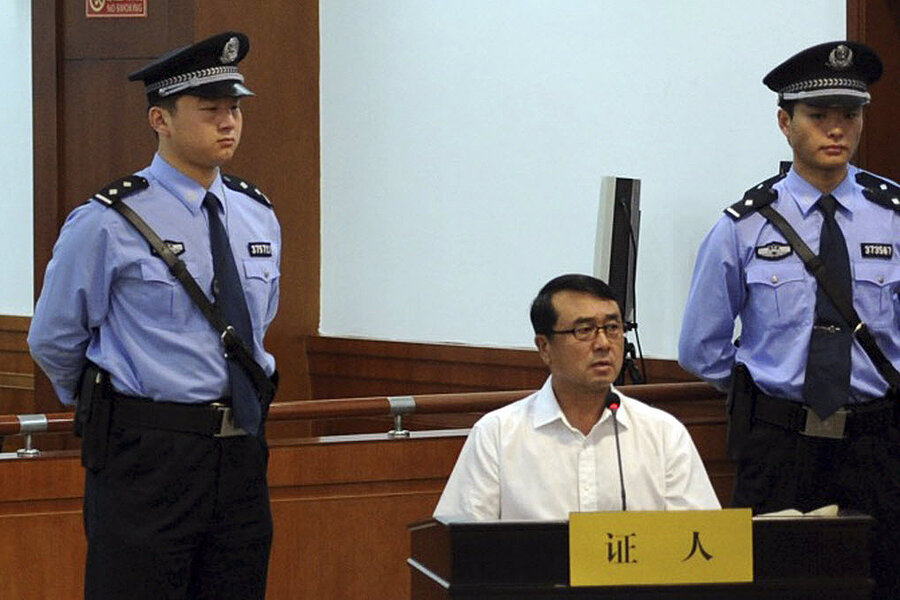Bo Xilai admits fault in police chief's defection, but says it wasn't a crime
Loading...
| Jinan, China
Ousted Chinese politician Bo Xilai told a court Saturday that he made mistakes that prompted his top aide's embarrassing US defection bid, but denied criminal responsibility for the incident that triggered the country's messiest political scandal in decades.
"I made errors and was at fault. It hurt the reputation of the party and the country, and I'm very ashamed," Bo told the Jinan Intermediate People's Court in a rare show of contrition on the third day of his trial for corruption and abuse of power.
"But whether it was a crime or not is a separate question," Bo said.
The ruling Communist Party is using the trial against Bo to cap a major political scandal unleashed last year when his aide fled to a US consulate bearing revelations that Bo's wife killed a British businessman.
That scandal led to Bo's ouster as Politburo member and party leader of the southern megacity of Chongqing, making him the most senior leader to fall from power in years. His purge is being cemented by criminal charges of abusing his power by interfering in the murder investigation and trying to hide the defection, as well as netting $4.3 million through corruption.
High-profile trials of senior leaders are regarded as the result of backroom negotiations, with the outcome decided by politicians and carried out by courts. Still, Bo has mounted an unexpectedly spirited defense, recanting earlier confessions, disputing evidence against him and calling his wife, who provided testimony against him, "crazy."
Court proceedings Saturday centered on events around the time when Bo's former top aide, Chongqing police chief Wang Lijun, fled to a US consulate in the neighboring city of Chengdu in February 2012, fearing for his safety after he told Bo that the politician's wife had killed a British associate.
Bo told the court Saturday that he reacted angrily to the report of the murder, slapping the police chief in the face and smashing a cup in fury because he thought Wang was framing his wife for the crime. Bo denied trying to cover up the murder.
"I thought he was being duplicitous. I have zero tolerance for duplicity," Bo said. "I slapped him in the face."
In his own testimony Saturday, Wang said the violent confrontation with Bo, as well as the disappearance of his subordinates who were investigating the murder, spurred him to flee to American officials for safety. He also said Bo did not slap him as much as punch him hard, causing his mouth to bleed.
"It was dangerous at the time," Wang told the court. "I was subject to violence, and my staff working closely with me and those working on the case disappeared."
Wang said he believed Bo had ordered an investigation into the police officers involved in the murder case to try to shield his wife, Gu Kailai.
In earlier testimony Saturday, Bo denied allegations that he had embezzled 5 million yuan ($800,000) in government funds in 2000, saying his wife stole the money without his involvement and revealing that the couple became estranged after he was unfaithful to Gu. He expressed remorse, however, that he had not acted to stop the misconduct.
The court's release of trial proceedings are in sharp contrast with the August 2012 conviction of Bo's wife in the murder of a British businessman, when she pleaded guilty in daylong proceedings and scant details were released.
Bo's trial had been expected to be similarly swift, but observers say giving him a chance to defend himself helps lend a veneer of legitimacy to what is widely seen as a political show trial. The trial has focused attention on Bo's alleged economic and official misdeeds and avoided discussing the threat he posed to China's leadership in his pursuit of a seat in China's apex of power ahead of last year's leadership transition.
"The leadership wants to have a trial that's seen as fair. You can't have a completely secret trial in today's China, it would be an embarrassment," said Brookings Institution scholar Cheng Li. "Bo Xilai is taking advantage of that trial to continue to perform as he did before."
Authorities remained on high alert for any unrest that might be triggered by the trial, closely guarding a security perimeter that expanded several miles around the court Saturday, with main roads in the vicinity sealed and many shops and restaurants shut.
Inside the courtroom, Bo questioned testimony from his wife and others that prosecutors presented that said he told Gu in 2000 to take the government funds to cover the expenses of accompanying their son in Britain while he attended middle school. Bo said that Gu had piles of her own money, and that she took their son overseas in a fit of rage after he had been unfaithful.
"She left after giving me only the courtesy of a notification," Bo said. "At the time, I had had an affair, and she was very angry. She took Bo Guagua away, largely because she felt wronged and was acting rashly."
Prosecutors have also charged that Bo accepted bribes from businessmen in the form of money or gifts to his family — including a villa in Nice, France, and plane tickets to three continents — in exchange for political favors.
The charges of bribery and embezzlement, based on the indictment's specified monetary amounts, carry penalties of between 10 years and life imprisonment, or death in severe cases, while the abuse of power charge could result in up to seven years in jail.
Courtroom revelations by the prosecution have laid bare the way that shady ties between powerful officials and businessmen can play out in China. Part of the couple's influence comes from their pedigree as the children of revolutionary veterans, a status that gives them access to important political and business networks.
Associated Press writer Didi Tang in Beijing contributed to this report.







